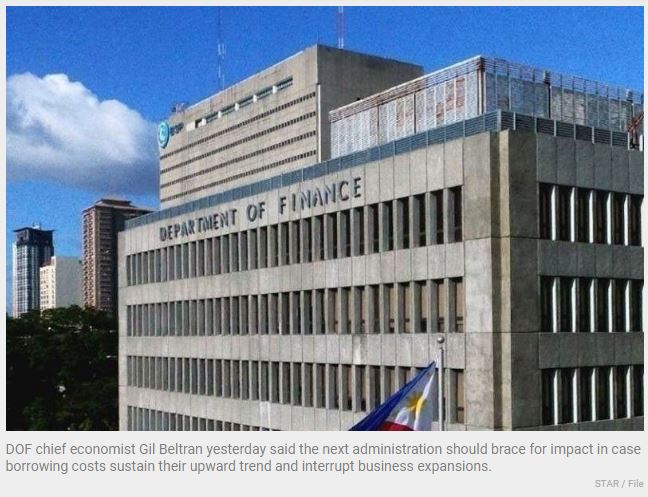Philippines: Rising interest rates may hurt FDI inflows, says DOF
MANILA, Philippines — The Department of Finance (DOF) has warned that the twin troubles of surging inflation and the war in Europe will push interest rates up and disrupt foreign direct investments (FDI).
DOF chief economist Gil Beltran yesterday said the next administration should brace for impact in case borrowing costs sustain their upward trend and interrupt business expansions.
“The ongoing rise in global inflation that followed the war in Ukraine may result in a global rise in interest rates that can both disrupt economic activity and potentially derail economic recovery,” Beltran said.
According to the Bangko Sentral ng Pilipinas (BSP), FDI in the Philippines grew by two percent to $2.44 billion in the first quarter, from $2.4 billion a year ago. While equity inflows slid by 44 percent to $540 million, investments in debt instruments rose by a third to $1.9 billion.
The BSP plans to raise interest rates by 25 basis points in its policy meeting today in response to the latest policy tightening of the US Federal Reserve. However, analysts believe the BSP could go for a 50 bps hike to prevent inflation from accelerating.
Inflation zoomed to a 42-month high of 5.4 percent in May, as food and fuel prices surged due to supply constraints arising from Russia’s invasion of Ukraine.
By jacking up interest rates, the BSP hopes to push borrowing costs up and, in the process, cut demand for inflationary drivers to hold off prices from spiraling any further.
Beltran said the government should maximize the reforms set in place by the Duterte administration, especially amendments to the Retail Trade Liberalization Act (RTLA), Foreign Investments Act (FIA) and the Public Service Act (PSA).
The new RTLA reduced the required capital for foreign retailers to P25 million, from P2.5 million – or at least P125 million – while the updated FIA removed the practice of professions from the negative list. The revised PSA limited the coverage of public utilities, opening up industries like telecommunications to foreign ownership.
Beltran said the next administration should keep the infrastructure program as a priority item in the annual budget. Based on estimates, for every percentage of gross domestic product that public construction goes up, private investments widen by 1.34 percent of GDP with a three-year lag, and by 2.03 percentage points with a six-year lag.
Last year, infrastructure spending, including subsidies for state-run firms and equities for local government units, amounted to P1.12 trillion, contributing at least 5.8 percent to GDP.
Under the revised fiscal plan, infrastructure disbursements should reach 5.5 percent of GDP in 2022, 5.4 percent in 2023 and 2024, and 5.3 percent in 2025.
Source: https://www.philstar.com/business/2022/06/23/2190212/rising-interest-rates-may-hurt-fdi-inflows-says-dof


 English
English




